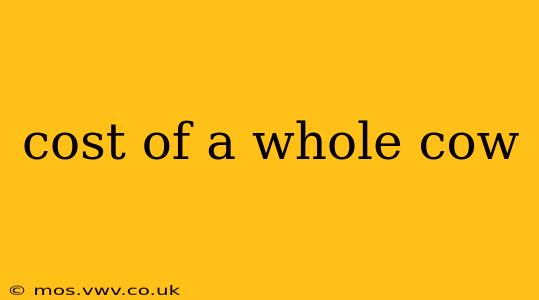Buying a whole cow might seem like a daunting task, but for many, it offers significant savings and access to high-quality, often locally sourced beef. However, the cost can vary dramatically depending on several factors. This guide will delve into the specifics, helping you understand what influences the price and how to make an informed decision.
What Factors Determine the Price of a Whole Cow?
Several key factors influence the final cost of purchasing a whole cow:
-
Breed: Different breeds of cattle have varying market values. Popular beef breeds like Angus or Hereford tend to command higher prices due to their desirable marbling and taste. Less common breeds might be cheaper.
-
Weight: The cost is typically calculated per pound of hanging weight (the weight of the carcass after slaughter and initial trimming). A larger cow will naturally cost more than a smaller one. Consider your family's size and consumption habits to determine an appropriate size.
-
Processing Fees: These fees cover the cost of slaughtering, butchering, and packaging the meat. They vary significantly by location and processor. Some processors offer different levels of service, affecting the price. Inquire about what's included (e.g., grinding, vacuum sealing).
-
Location: Geographic location plays a significant role. Areas with higher land costs and labor expenses will generally have higher beef prices. Rural areas often offer more competitive pricing.
-
Season: Prices can fluctuate slightly throughout the year, sometimes influenced by seasonal availability and demand.
-
Direct Purchase vs. Share: Buying a whole cow outright is usually more cost-effective per pound compared to buying a share. However, buying a share reduces upfront costs and risk.
How Much Does a Whole Cow Typically Cost?
Providing an exact figure is impossible without specifics, but a reasonable estimate for a whole cow (depending on weight and location) ranges from $3 to $6 per pound of hanging weight. This doesn't include processing fees, which can add another $800 to $1500 or more, depending on the services selected.
Therefore, a 1,000-pound cow might cost anywhere from $3,000 to $6,000 plus processing fees, resulting in a total cost ranging from $3,800 to $7,500 or more.
How Much Beef Do You Get From a Whole Cow?
The amount of usable beef you receive depends on the cow's weight and the butcher's skill. Generally, you can expect around 60-70% of the hanging weight to be usable cuts of beef. This means a 1,000-pound cow might yield approximately 600-700 pounds of usable beef.
What are the Costs Involved Beyond the Initial Purchase?
Beyond the initial purchase and processing fees, consider:
- Freezing Costs: You'll likely need a large freezer to store all the meat. Factor in the cost of purchasing or renting a freezer, and the electricity to run it.
- Transportation: You may need to arrange transportation from the processor to your home or storage facility.
Is Buying a Whole Cow Worth It?
Buying a whole cow can be a financially savvy choice, particularly for large families or those who consume a lot of beef. It typically offers a lower per-pound cost than purchasing beef at the grocery store, especially considering the potential for higher quality. However, the considerable upfront investment and storage requirements need careful consideration.
Can I Buy a Share of a Cow?
Yes, many farms and ranchers offer the option of buying a share of a cow, which significantly reduces the upfront financial commitment. This is an excellent entry point for those interested in buying local beef but unsure about the full commitment.
Where Can I Find a Local Farmer to Buy From?
Your local farmers' markets, agricultural extension offices, and online directories of local farms are great places to start your search. Many farms advertise directly on their websites or social media channels.
By carefully considering these factors and doing thorough research, you can make an informed decision about whether buying a whole cow is the right choice for you and your family. Remember to thoroughly vet any farmers or ranchers you are considering and ask detailed questions about their practices and pricing structure.
